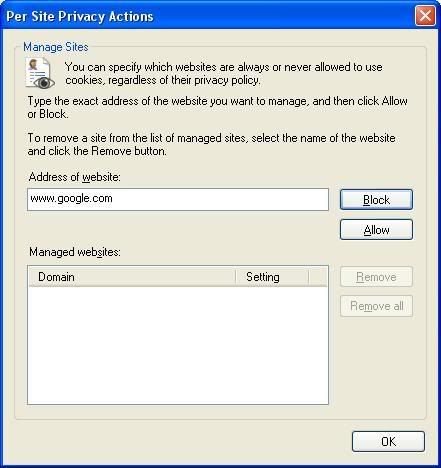If you're a Firefox user, you can also use the CustomizeFirefox extension that among other things, "anonymizes" you when you use Google so that your searches can't be tracked. Finally, think carefully before turning on Google's Search History feature. Search History lets you revisit all your searches and shows what you've searched for every day. When you use Search History, Google stores a record of all your searches on its servers. If you're worried that that search history may fall into the wrong hands, or be subpoenaed by the government, simply don't use the service.
If you are like me who uses Google extensively as your search engine, you are particularly vulnerable because Google will have a record of all your searches. This is made worse if your Google accounts are link. E.g. Blogger, AdSense, Gmail, Analytics etc. Even if you don't log into Google, it can track your searches because it uses cookies to track from session to session.
The simple was is to delete all your cookies before and after you visit Google. But that's problematic because cookies can be quite useful - they can log you into some sites automatically or remember your site preferences.
Source: Computerworld A simpler solution is to block only Google from placing cookies on your PC. How you do it varies from browser to browser. In Internet Explorer 7, for example, choose Tools–>Internet Options, click the Privacy tab, then click the Sites button. In the "Address of Web site" box, type in www.google.com, and click Block. From now on, when you visit Google, it won't be allowed to place a cookie on your hard disk, and it won't be able to track your searches. In Firefox 2, select Tools–>Options, select the Privacy tab, and click Exceptions. Then type www.google.com into the "Address of Web site" box and click Block. If you use another search engine, by the way, you can use this same technique to keep its cookies off your hard disk as well.
A simpler solution is to block only Google from placing cookies on your PC. How you do it varies from browser to browser. In Internet Explorer 7, for example, choose Tools–>Internet Options, click the Privacy tab, then click the Sites button. In the "Address of Web site" box, type in www.google.com, and click Block. From now on, when you visit Google, it won't be allowed to place a cookie on your hard disk, and it won't be able to track your searches. In Firefox 2, select Tools–>Options, select the Privacy tab, and click Exceptions. Then type www.google.com into the "Address of Web site" box and click Block. If you use another search engine, by the way, you can use this same technique to keep its cookies off your hard disk as well.
(Click image to see larger view)
Note that because Google won't be placing cookies on your hard disk, you may not be able to use various Google services, such as Gmail.
Google has numerous services you can sign up for, including RSS readers called Google Reader and Google Groups, which let you read newsgroups and other discussion groups. The more Google services like this that you sign up for, the more information Google knows about you. In addition to your searches, it will know what blogs and newsgroups you read, for example. This makes it that much easier for the search giant to create a profile about you. So either don't sign up for those services or else create separate Google accounts for each of them, so that the search engine can't correlate all your interests.